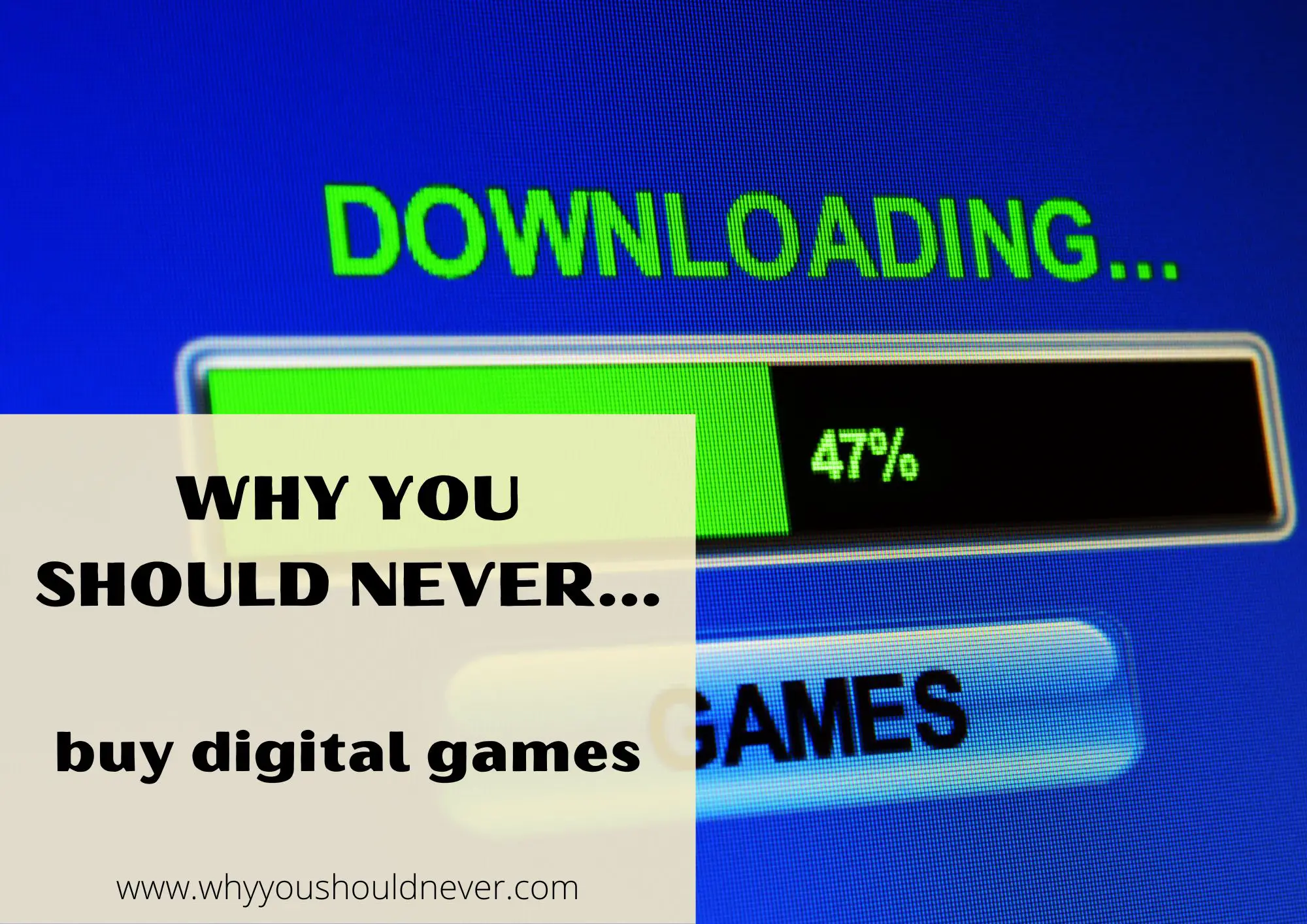![]()
Why You Should Never Buy Digital Games
In the midst of our digital age, buying games from the comfort of our own homes has never been more tempting. A few clicks, and boom! That game everyone’s talking about? It’s downloading onto your console or PC, ready to be played in mere moments.
No need to brave the outside world, no risking a title being out of stock, and often, there are some pretty sweet digital sales to top it all off. Ah, the wonders of technology!
Now, this all sounds well and good, but that gaming convenience comes with many, many downsides, some you might not have even considered. So let’s explore some of them, shall we?
19 reasons why you shouldn’t buy digital games
1. The fleeting nature of digital
Unlike physical copies where you possess an actual item, with digital games, you merely hold a license to play. This ephemeral existence means if the licensing rights shift or disappear, your favorite title might go poof even if you paid for it.
2. Goodbye, resale value
With a physical game, once you’re done, you can sell, trade, or even gift it. But a digital game? It’s tethered to you forever. That $60 could have been turned into a neat $15 resale, but alas, no such luck with digital.
3. DRM drama
Digital Rights Management systems can tie your game to specific accounts or machines. Remember that family shared computer or console? Suddenly, it’s a logistical nightmare ensuring everyone can play without infringing on DRM restrictions.
4. Server shenanigans
All those hours poured into a game might be for naught if a server goes down or a company closes shop. Remember those nostalgic titles from defunct companies you loved? Some might never be retrievable.
5. Single account syndrome
Imagine this: years of game collecting, and one day your account gets hacked, banned, or you simply forget the login. Years of investment, both emotional and financial, could evaporate in a blink.
6. The storage struggle
Modern games can be massive, often exceeding 100GB. If you have several of those games, you’re looking at potentially terabytes of space. And if you’re thinking SSDs will solve your woes, remember, they don’t come cheap.
7. Download despair
A fresh game release can be dampened by slow internet speeds, making that “play now” dream a distant reality. Plus, for those with data caps, large games can be the bane of your monthly bill.
8. Gifting grief
Want to gift a game to a friend abroad? Licenses and regional restrictions could turn your generous intention into a convoluted mess of “This product isn’t available in your country”.
What’s more, a digital gift just doesn’t make a very attractive gift. Want to surprise your buddy with a game? With digital, it’s less “surprise!” and more “here’s a code, hope you figure it out”.
9. Missing the extras
Physical editions sometimes come with added goodies – badges, stickers, artbooks. With digital? Best you could hope for is a downloadable wallpaper.
10. Oops, accidentally bought it
In the maze of one-click buy buttons and instant transactions, you might end up with a title you never intended to buy. And the return process? Often more complicated than just handing back a disc.
11. Game preservation? Pfft!
When a digital game gets removed from a store, finding it becomes a Herculean task. Physical games don’t just vanish from store shelves – they end up in sales bins, second-hand shops, or collector’s shelves.
12. The regional rigmarole
Digital games often face regional locks. While physical games can be imported (at times bypassing censorships or regional edits), digital games keep you bound to regional whims and fancies.
13. Share? Don’t you dare!
Sharing a digital game requires sharing accounts or passwords, a potential security risk. Gone are the days of just lending a cartridge to a pal.
14. Pricing pitfalls
Digital storefronts monopolize the pricing structure. Without competition, you’re at the mercy of their sales, or worse, lack thereof.
15. Pawn shops? Nope
Physical games, when times are tough, can be pawned or sold for instant cash. Digital games? No such safety net.
16. Digital storefront dominance
Committed to a single digital storefront? Then you’ve given them control over your gaming choices, prices, and even the kind of content they choose to curate.
17. Unreliable internet unhappiness
Digital games often require updates. With shaky internet, you’re staring at an error screen more than your beloved game’s menu.
18. Impulse-buying blues
The ease of digital storefronts can lead to an avalanche of impulse purchases. Physical stores, at least, make you think twice before reaching the counter.
19. Nostalgia nix
Remember the pride in showing off your physical game collection? With digital, it’s less a showcase and more a list on a screen.
Final Thoughts
Digital gaming, while a marvel of modern convenience, is not without its pitfalls. It’s always wise to weigh convenience against commitment, and immediate gratification against potential future frustrations.
As a gamer myself, I have a mixture of both digital and physical games in my collection. Each has its merits, but there’s an undeniable charm to holding a game box, flipping through a manual, or even just admiring the art on a game cartridge or disc.
As technology advances and the digital tide continues to rise, maybe, just maybe, we should occasionally anchor ourselves with the tactile and tangible to truly appreciate the evolution of gaming.
Whatever your preference, happy gaming!
